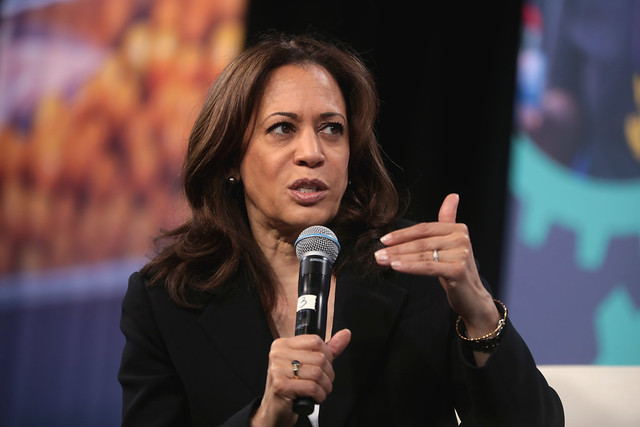There’s no question that the American health care system is a crazy quilt that leaves health “insurance companies in charge,” as Senator Kamala Harris appreciates. Unfortunately, her health reform proposal, “KamalaCare” does not match her rhetoric. It leaves health insurers running the show.
Harris’ proposal relies extensively on for-profit health insurers to provide coverage. But, they are the reason health care is unaffordable and the reason people are often faced with denials of care and coverage. She claims her plan will hold the health insurers to account if they game the system. That sounds great in theory, but how exactly would it work in practice?
Like Senator Bernie Sanders’ and Congresswoman Pramila Jayapal’s Medicare for All legislation, Harris’ proposal makes an improved traditional Medicare public plan available to all Americans. Unlike Sanders and Jayapal, after a ten-year transition, she keeps the for-profit health insurance industry in business, offering Medicare Advantage plan options to people who want a private plan.
Harris does not explain what her multi-payer plan would do to reduce the $503 billion a year in administrative costs in our health care system. She also does not explain how it will rein in doctor and hospital rates. She does say that she would cut prescription drug prices so that we pay what other wealthy countries pay for our drugs. And, while that could save as much as $250 billion a year, it is not the hundreds of additional billions in savings we achieve from the Sanders and Jayapal Medicare for All bills.
Consequently, it is hard to see how Harris makes health care affordable. Today, annual out-of-pocket limits in Medicare Advantage plans are $5,059 for in-network care alone. What would change?
Putting costs aside, like many other pundits and candidates, Harris believes that people want health insurance plan choices more than they want affordable health care. But, in my entire professional career, I’ve never met anyone who said they cared about having the choice of commercial insurance plans. To the contrary, they don’t like making that choice. The choice we all want is the choice of doctors and hospitals we want to use at an affordable price.
Moreover, Harris fails to explain why private insurers will be any more accountable under her proposal than they are today–largely unaccountable. She does not seem to realize that Medicare Advantage plans, from their inception, have failed to comply with many of their contractual obligations, threatening the health and safety of their members; and, the federal government has lacked the power to punish them effectively, let alone to get them to comply with their legal obligations.
Medicare Advantage plans can’t even manage to provide their enrollees with up-to-date provider directories. They engage in widespread denials of care and payment, according to the US Office of the Inspector General. And, they won’t turn over data, required by law, that would reveal the services they provide their members to allow an independent assessment as to whether they are meeting their members’ needs.
Federal audits of Medicare Advantage plans have not helped to keep Medicare Advantage plans in line. Short of a provision in the law that either held Medicare Advantage CEO’s personally liable for failures to comply with the law or put them out of business for failing to comply, how exactly will Harris’ proposal induce them to behave properly? Or, is Harris prepared to call for these severe penalties?
If not, what is she thinking? Other wealthy countries manage to guarantee health care to everyone at half the cost we pay, and they rely on private insurers. But, for the most part, their insurers are non-profit. And, the insurers are regulated like utilities. It feels like a fantasy to believe that our for-profit, shareholder-accountable, health insurers are going to behave any differently than they behave today. They have money and power, which they will continue to wield to make sure they can operate without accountability.
In sum, 200 economists have united behind Sanders’ and Jayapal’s Medicare for All single-payer proposals because Medicare for All saves money and guarantees affordable health care to all. Harris’ health care reform proposal introduces new rules for private health plans without any meaningful cost savings or insurer accountability. Regardless of what Harris believes, her health reform proposal will not give people the affordable health care they want and need.
Here’s more from Just Care:
- Congresswoman Jayapal introduces Medicare for All bill
- New study finds Medicare for all generates overall savings of more than $5 trillion
- Medicare for All is the only realistic way to rein in health spending
- When to claim Social Security benefits
- Six reasons you need a primary care doctor in this age of specialization











Administrative costs equates to people (jobs). Assume that the average salary in health care administration is $50,000. With $500 Billion in admin costs, this equates to 10 Million jobs.
Who is talking about those people and what jobs they will get once we cut all these health care administration jobs? Bernie? Jayapal? If so, I haven’t heard it.
We need to cut healthcare costs. There are no cuts without pain unless it is attacking fraud (which we need to do), but that’s a small part of the equation.
Everyone is going to “get a haircut” if we get costs down to manageable levels. I just want to see someone talk about the most vulnerable people in the system who will take the biggest hits.
Yes. If we get Medicare for All with no private insurance option and no out-of-pocket health care costs, 834,322 people will lose their jobs working for health insurance companies or in administrative roles related to private health insurance. The economists at University of Massachusetts who analyzed the Sanders plan factored in the cost of a just transition for workers who would lose their jobs, including retraining workers and giving them extra pay and still found $5 trillion in savings over 10 years. You can read the study here: https://www.peri.umass.edu/publication/item/1127-economic-analysis-of-medicare-for-all
More than 70 million vulnerable people who are either uninsured or underinsured are struggling today to get access to the care they need. That’s nearly 100 times the number of people who would need to find new jobs.